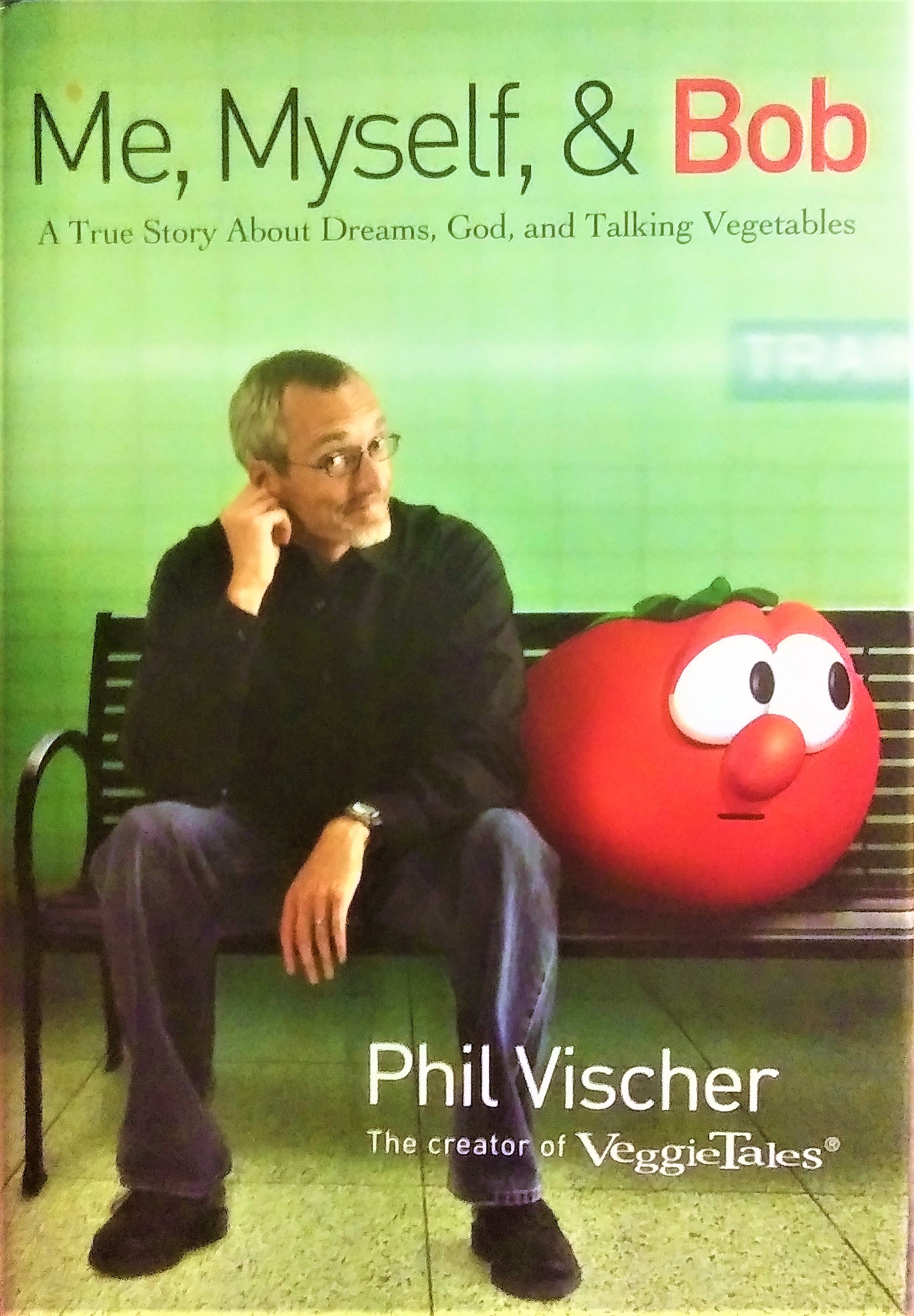Phil Vischer’s autobiography
There was once a broadcasting empire based on sentient vegetables telling Bible stories and singing silly songs that lasted well over twenty years, cultivating millions of dollars, and enriching many childhoods including mine. April fools — oh wait, that actually happened. “Me, Myself, and Bob,” is an autobiography by “Veggie Tales” creator Phil Vischer chronicling his childhood, career and creation of “Veggie Tales”.
“I was born in Muscatine, Iowa, a town of about 25,000 people on the banks of the Mississippi river… We were a religious family… My parents were in church every Sunday morning, Sunday night and Wednesday night prayer meetings.” Except for when his father skipped Sunday morning service to orchestrate a publicity stunt culminating with him pushing then-Muscatine mayor Evelyn Shauland out of a hot air-balloon into the Mississippi river during a weather mishap. April fools, oh never mind, that did happen. “An event with no redeeming spiritual significance whatsoever,” Vischer speculates.
“Fairly early in my life, I noticed my brain was weird… it had a way of looking at things from a slightly twisted angle…” When Vischer was 8-years-old, his father gifted him with a video recorder with which he made stop-motion videos with his toys and later taught himself mathematical equations to animate a bouncing ball on his Atari 400. Inspired by digital works in films such as “Tron” and “Star Wars,” he studied digital animation and filmmaking.
“Without the irrational exuberance of youth… we wouldn’t have ‘Veggie Tales’…” Inspired by the outreach of MTV, Vischer sought to make film as a way of Christian ministry. “I was… convinced that computer animation would be the key to my own storytelling — to my work for God — but the technology of the day wasn’t cooperating.” Unable to afford his digital editing equipment, Vischer made a deal with a Chicago production house to use their editing and graphics at night when the employees left for the day.
He met with a beautiful young singer named Lisa, with whom he would later marry (and who would voice Junior Asparagus). “She turned and said something sarcastic. I was intrigued. Most Bible conference girls aren’t familiar with sarcasm.”
Like his parents, her parents had split mainly due to her father’s failing mental health. At the time of writing, Vischer explains that he has just reached his 16th wedding anniversary; “…I can’t tell you how much emotion I feel about… building a marriage that has outlasted those of both our parents…” He considers his successful marriage to Lisa to be his greatest life achievement.
Vischer met and befriended another film student named Mike Nawrocki and the two tried to launch a Christian comedy show for teens (Studio C has entered the chat) but was told by one of the creative directors that the real success was parents buying Christian videos for their children. “At this point in my career, the longest piece of animation I had ever produced was less than 60 seconds.” At that time, nobody had produced a half-hour computer animated video, which giving Vischer a lightbulb moment. “‘But really,’ I thought, ‘How hard could it be?’”
Phil Vischer envisioned an animation technique called “lattice deformation,” making animated monopods expand and squash in movement. He originally envisioned sentient candy telling Bible stories over vegetables. In fact the first episode was of Larry the Snickers and Bob the jaw-breaker presenting the story of “Daniel in the Lion’s Den,” and the entire video had to be reanimated in post to replace the candy with vegetables to appease parents suggesting it would influence children to eat vegetables. April Fools! (This time it really is an “April Fools” gag, though the original vision of candy instead of vegetables is true.)
But there was a flipside to that coin. “One mother described in great detail her effort to sneak a cucumber away from her toddler so it could be secretly sliced in the next room without traumatizing the young Larry fan.” Vischer envisioned Larry the Cucumber before Bob the Tomato (for those wondering who came first) and the rest is history.
Though Veggie Tales may have faded in recent times, its impact and non-preachy messaging appealed to Christian and non-Christian audiences alike with its wit, humor, and unabashed silliness. “The impact God has planned for us doesn’t occur when we’re pursuing impact. It occurs when we’re pursuing God.”
